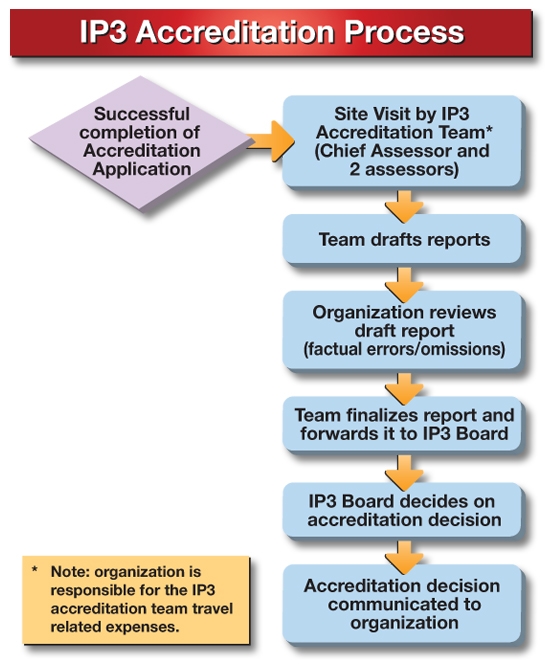IP3 Accreditation Program
Get the simplified IP3 accreditation guide
IP3 Application & Accreditation Guidelines v8
Benefits of IP3 Accreditation
The IP3 accreditation process was built on the ISO standards 17024 and 24773
IFIP IP3 accreditation:
- Promotes excellence
- Encourages quality improvement through a continuous self-improvement process;
- Assures government and the public at large that the organization has defined mission objectives and strives to meet them;
- Provides a detailed evaluation of the organization and the certification program(s) it provides;
- Identifies areas of strength and weakness within the organization;
- Offers a forum for the communication of organizational needs, both internally and externally;
- Provides a mechanism for developing documents, including strategic plans and budgets;
- Provides a credible, independently verifiable method of differentiating accredited organizations from non-accredited organizations that may not adhere to important industry standards;
- Fosters pride in the organization when it’s recognized;
- Fosters professionalism within the member body.
Application of the IP3 Accreditation
A member with an IP3 accredited scheme of certifying their individual members will be able to apply the IP3 global standard to their certified members.
Assessment Process
Accrediting members will be required to demonstrate that they meet IP3 requirements in respect of:
- Skills and competence
- Body of knowledge
- Continuing professional development
- Codes of conduct and ethics
- Organizational capability and maturity
The quality and consistency of standards will be heavily dependent on the processes by which those bodies are accredited.
The purpose of the IP3 assessment process is to determine whether:
- The organization has in place a coherent set of documented standards that meet the requirements specified by IP3;
- Those standards are supported by properly documented policies and processes;
- Those policies and processes are applied effectively in practice;
- The organization has the maturity and viability required to sustain an effective professional organization and to maintain the required standards over the longer term.
Accreditation Principles
- Avoid over-prescription – build locally as far as possible, engaging national bodies;
- Aim for an inclusive profession in which both the traditional and the new IT communities feel comfortable;
- Do not reinvent the wheel – build on existing standards and support frameworks;
- Provide clear advice and guidance in respect of the required standards;
- Build frameworks within which individual national bodies can develop incrementally to international standards;
- Provide mentoring and support from those that have achieved the required level for those aspiring to do so;
- Build rigorous processes for assuring international consistency;
- Provide additional resource and assistance for member societies in developing countries.
The IP3 aim is not to build a fully formed international profession, but to build a framework that will facilitate the development of such a profession through action by member societies.
The framework
The framework for the international profession has been built on the principle of subsidiarity with building blocks at 3 levels:
Level 1: A set of definitions to ensure a consistent base of common understanding. Only those items that are essential to providing a solid foundation for an international profession are included at this level.
Level 2: Intended to cover the other essential and some advisable ingredients for an effective profession in terms of both standards and governance processes – within this it is the intention to allow national bodies maximum freedom to develop in a way that best fits their local needs.
Level 3: Includes the standards and processes necessary to ensure a consistent international standard for both national institutions and for individual practitioners.
The Accreditation Fees
There is no accreditation fee, however, the accreditation effort will have some direct and indirect costs. Resources need to be allocated to manage the accreditation application process and the logistics associated with the visit. A three (3) person IP3 accreditation team will conduct a site visit, which typically takes around 3-4 days. The team will be assisted by an independent panel member from the organization’s country. The organization will be responsible for any costs associated with the site visit, including travel, accommodation and food and beverage.
Accreditation Visit Agenda
IP3 encourages organizations to use the IP3 suggested Visit Agenda. The agenda outlines who the team needs to meet with and ensures that a proper assessment and audit can be carried for all relevant areas.

